HYDERABAD, INDIA (October 11, 2012)– With support from the CBD Secretariat, thirteen women experts in biodiversity, conservation and gender equality from 9 countries – India, Nepal, Colombia, Nigeria, Kenya, Costa Rica, Suriname, the Philippines, and the U.S. – form WEDO’s delegation to the COP, working together to host a daily women’s caucus, deliver interventions on women’s rights and gender equality, and push for enhanced implementation on the many policy commitments made in recent years. Read more about the delegation here.
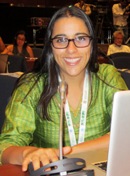 Andrea Quesada, COSTA RICA
Andrea Quesada, COSTA RICA
A Project Coordinator for the Women’s Environment and Development Organization (WEDO), based in Costa Rica, Andrea has a background in botany and obtained her masters degree on Ecology and Evolution from the University of Pittsburgh in 2007. Since 2007, she has been involved in numerous pioneer activities to include a gender perspective in climate change negotiations. As part of the Global Gender and Climate Alliance (GGCA), Andrea produced documents on gender and climate change, participated in the UNFCCC negotiations and organized various workshops and international events on the importance of gender considerations in climate change discussions. She has also worked with the UNDP Mexico office and UN ISDR on the development of guidelines on gender and various issues related to climate change and disaster risk reduction. At WEDO, her work has recently focused on the gender implications of a REDD strategy (reducing emissions from deforestation and forest degradation): ensuring that initiatives, proposals and financing mechanisms related to REDD incorporate a gender perspective. Andrea is currently leading the team of delegates attending the CBD.
 Dr. Archana Godbole, INDIA
Dr. Archana Godbole, INDIA
Having earned a master’s degree in botany and a PhD in ethnobiology, Dr. Archana J.Godbole specializes in community-based conservation projects in mountain regions. In 1994, she founded the Applied Environmental Research Foundation (AERF) which is committed to change in the field of conservation & development. She has developed and implemented community based conservation projects throughout India, notably in North Eastern India and the Western Ghats of India. Her special areas of interest include indigenous knowledge and its application in conservation and development, and participatory approaches in natural resource management.
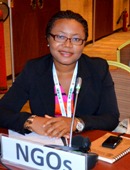 Esther Agbarakwe, NIGERIA
Esther Agbarakwe, NIGERIA
Since earning her bachelor’s degree in Chemistry, Esther Agbarakwe has gained eight years of experience working on environmental issues. She is a climate change policy expert and trainer with extensive experience in creating, facilitating and managing youth-led projects. Ms Agbarakwe has represented Nigeria and Africa at over ten high-level global governance meetings on sustainable development and has served as the African coordinator of the UN Commission on Sustainable Development (UNCSD) Youth and Children Major Group. In 2009, she co-founded the Nigerian Youth Climate Coalition, which became the biggest youth climate movement in Nigeria. Most recently, she served as an Atlas Corps Fellow with Populational Action International in Washington DC.
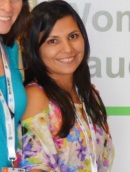 Evelin Acosta Gutierrez, COLOMBIA
Evelin Acosta Gutierrez, COLOMBIA
Evelin Acosta Gutierrréz is a Social Worker for the Indigenous Wayuu, Ipuana in Colombia. She works primarily on capacity building for the Wayuu women of the Cabildo Wayuu Nouna Camp. At the Camp, Evelin works to build organizational capacity and install a basic social infrastructure, engage the community in the conceptual and methodological debates taking place within the indigenous movement in Colombia, and empower to collectively define political strategies and resolutions to the major problems facing the community.
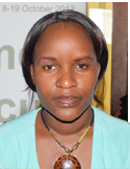 Floridah Kagendo Miriti, KENYA
Floridah Kagendo Miriti, KENYA
Floridah currently works as a District Crop Development Officer in the Gatundu South District for the Ministry of Agriculture in Kenya. Her work centers around the development of and participation in agricultural programmes and innovations that are gender friendly and geared towards conserving and sustainable use of agricultural biodiversity. She has conducted several trainings and workshops with women farmers on gender issues, climate change and conservation of agricultural biodiversity. Ms. Miriti speaks English, Kiswahili, and Arabic.
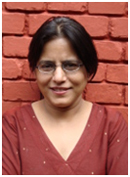 Kanti Risal, NEPAL
Kanti Risal, NEPAL
An expert in social development and gender, Kanti Risal is dedicated to mainstreaming gender and social inclusion in forestry and national climate change strategies, as well as peace-building and post disaster recovery programmes. During her work with the Livelihoods and Forestry Program (LFP) of the UK Deptartment for International Development (DFID), she brought a socio-economic perspective to the Plan Vivo pilot Project, which now operates in four villages in Nepal. Also, she participated in the preparation of Nepal’s Readiness Proposal -REDD led by the Ministry of Forest & Soil Conservation (MOFSC)which was submitted to Forest Carbon Partnership Facility (FCPF) of the World Bank.
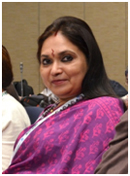 Dr. Madhu Verma, INDIA
Dr. Madhu Verma, INDIA
Dr. Madhu Verma is a Professor of Environment & Developmental Economics at the Indian Institute of Forest Management in Bhopal, India. Her special areas of interest include environmental economics & policy analysis – forest, land and wetland valuation, livelihood economics, and conservation & environmental finance. Her career of 27 years include work experience with international institutions like the World Bank, UNEP, EU, DFID, ADB, JICA, IIED, WII, IVM etc. & various ministries of Govt. of India like MoEF, MoSPI, MoRD, MoH, MoD & National Forestry Commission and THFC etc. Most recently, she has been selected as Fulbright Fellow under Fulbright Nehru Environmental Leadership Programme (2011-12).
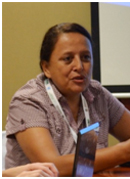 Maria Josee Artist, SURINAME
Maria Josee Artist, SURINAME
Ms. Artist lives in Suriname, where she works as a community development specialist for the Association of Indigenous Village Leaders. She focuses on issues such as economic empowerment of indigenous women in the communities, capacity building on climate change, especially REDD+ (reducing emissions from forest degradation and deforestation) and its impacts on indigenous women. In addition, she is an experienced facilitator of trainings on the rights of indigenous peoples as they relate to important issues in Suriname. Ms. Artist is a representative of the indigenous peoples of Suriname in the Steering Committee of the Global Environment Facility (GEF) Small Grants Program.
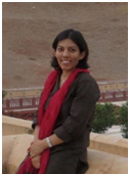 Mona Datta, INDIA
Mona Datta, INDIA
As a human geography teacher at the Vasant Valley School in New Delhi, Mona Datta has spent over 16 years educating students from K-12. As head of the Environment and Outreach program of her school, she trains and facilitates students as they design and implement “green school reports.” In 2007, and in March 2011, Mona, accompanied 60 high school students for the Yamuna Yatra, a twelve-day tour of self-discovery, the aim of which was to explore the ecological, social, cultural, spiritual and political facets of the Yamuna river. Mona is a LEAD Fellow, (Europe, Cohort-14) and an ILEP fellow, having completed five months of teacher leadership training in the United States in 2010 as part of the International Leaders in Education Programme and in 2011 she was trained by AL Gore at The Climate Project Training, held in Jakarta during the Asia Pacific Summit.
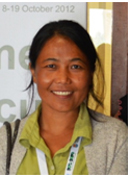 Sarita Lama, NEPAL
Sarita Lama, NEPAL
Currently, Sarita Lama works for the Rural Self-Reliance Development Centre (RSDC), and is responsible for the implementation, management and monitoring of poverty alleviation programs, DRR (disaster risk reduction), WASH (water supply, sanitation and hygiene) and effective promotion of cooperative activities, especially with regard to gender, poverty and marginalization. Most recently, she supported DANAR (Dallit Alliance for Natural Resource Management) by designing a research proposal to study ‘inclusion practices’ on the TAL-CHAL (Terai Landscape and Chitwan Landscape program) areas of the WWF. Sarita has a master’s degree in conflict, peace and development studies from Tribhuvan University, Nepal and Ruhuna University, Sri Lanka.
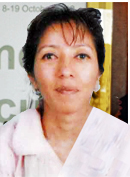 Sushila Chatterjee Nepali, NEPAL
Sushila Chatterjee Nepali, NEPAL
Since 1982, Sushila Chatterjee Nepali is a forester by profession, part of the second batch of women allowed entrance to the Institute of Forestry. She worked for the United Mission to Nepal as a consultant, to integrate gender in the water and energy commission secretariat. She received her Masters from the University of Life Sciences in 1996 in Management of Natural Resource and sustainable agriculture. She has spent 11 years working as community development specialist in natural resource and biodiversity conservation. For this, in 2002, she was awarded WWF’s Women in Conservation. She completed her PhD in 2012 from Institute of Forestry Pokhara, Nepal looking at the “Perception of change and impact of conflict on local livelihoods in the buffer zone and Khata corridor, Bardia, Nepal.” Recently she also conducted the terminal evaluation for Western Terai Landscape Complex Project as Gender, Social Inclusion and Livelihoods expert. She has contributed a lot in Gender and Natural resource management to implement and support GESI policies. She has also worked to conduct Rapid Assessment of Protected Areas of Nepal complying with CBD management effectiveness assessment.
 Tess Vistro, PHILIPPINES
Tess Vistro, PHILIPPINES
A firm advocate for the rural and indigenous women of the Philippines and other Southeast Asian countries, Tess Vistro focuses on the issues of women’s land rights, food security and biodiversity in her work for the Asia Pacific Forum on Women Law and Development. Also, with The National Federation of Peasant Women, she has documented the impact of climate change on the lives of rural women, and the impact of drought and flooding on the productivity of women farmers. She believes that the process of raising the consciousness of development issues among rural women is a result in itself.
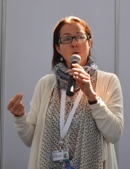 Vivienne Solis, COSTA RICA
Vivienne Solis, COSTA RICA
A biologist by trade, Vivienne Solis has participated in interdisciplinary and inter-institutional projects of environmental conservation and training in the field of biodiversity. She is the founder of CoopeSoliDar R.L., a cooperative formed by people of different knowledge and interests based on an ethical background of common values. For the past two decades, she has maintained a focus on community-based, sustainable use of wildlife and other natural resources, interdisciplinary discussions on the fair use of biodiversity elements, and local participation in the conservation of protected areas.


